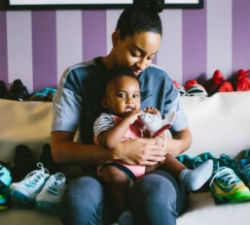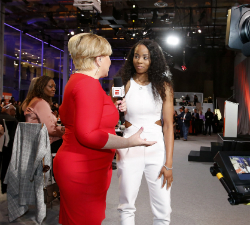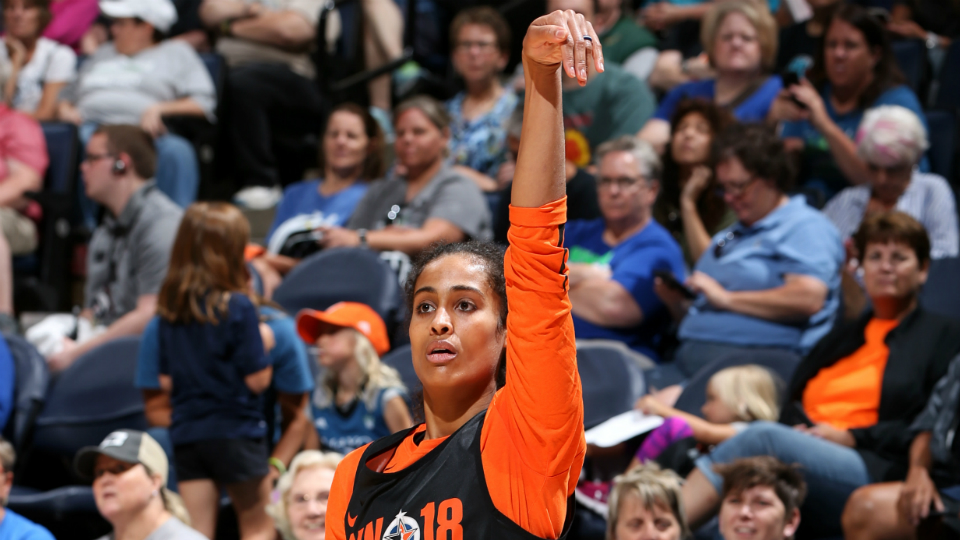Q&A: New Dream Head Coach Nicki Collen On Her Move to Atlanta

The Atlanta Dream sought a new head coach this offseason, and in the the front office’s first interview, they found their answer: Nicki Collen. Collen has spent the past two years in the WNBA as an assistant coach under Curt Miller with the Connecticut Sun. Collen was an important part of the process in bringing the Sun from a 14-20 record in 2016 to a 21-13 record this past season and helping Miller win the 2017 WNBA Coach of the Year award.
WNBA.com spoke with Collen to get her thoughts on the next step in her career.
I read that you were offered the position on the spot during the interview? What was that moment like?
Pretty surreal to be honest. It was humbling and a little shocking. I knew the process step by step, from phone interviews with the owners to bringing in top candidates. And I was the first to come in, so I just assumed there was another candidate coming in behind me. I think in my mind, I hadn’t processed that it would happen like that. The moment when Mary [Brock] and Kelly [Loeffler] offered me the job was pretty surreal. I was a little bit blown away. But the great thing about that was that it kind of allowed the conversation to steer to, ‘What do we have to do to make this place great?’ So instead of me answering all their questions, it became so much more collaborative.
Having worked under many different coaches, what kind of head coach will you be?
Probably a mixture of all of them. I certainly think personality-wise, I’m probably the most like Curt, as far as my intensity and passion. Hopefully a little less volatile on the sidelines, but I definitely have that same energy, that same passion.
My approach will be about spacing and personnel. I would have wanted to play this way anyway, but with the Dream, we have to play fast. We have to play fast in the open floor. I think where we’ve got to grow is in our half court efficiency, and really utilizing the great players we have in moving them around. My goal will be to be a little like we were in Connecticut this year. We moved the ball to the open person. We were hard to guard because everyone could score. That’s the kind of team I want to be.
Defensively, I’ve been a defensive coordinator many years. I think this Atlanta team can be special defensively, with the combination of athleticism and length. I get excited thinking about it.
This team didn’t make the playoffs but has three All-Stars, Angel McCoughtry potentially coming back, Brittney Sykes All-Rookie, players arriving via trade…
A lot of great pieces. It’s about meshing those pieces, building a culture where team success will continue to allow each of them individually to grow their games. There certainly are areas of the roster that can improve. But my job is to put those players in position to utilize their individual talent.
How was the time you spent with the three Dream All-Stars (Layshia Clarendon, Tiffany Hayes & Elizabeth Williams) in Seattle that weekend?
I learned a little bit about them personality-wise. You’re not going to coach them hard in the All-Star Game — let’s be real. But you kind of learn, are they introverted or extroverted? That type of thing. So you just get a read on people. I know they’re competitive, they’re hard workers, and they want to win.
Did leaving Curt and the success you guys had last year make it a tough decision?
On one hand, it was an incredibly hard choice, because I absolutely loved my job. I love the Connecticut Sun organization. I love Curt. He gave me a lot of responsibility, and I loved our team. I genuinely loved each and every one of those girls. But in other ways, it was easy because I got to know Theresa, Mary and Kelly and their vision for the Dream, and realized the opportunity to be a head coach. There’s nothing wrong with being a career assistant coach. It doesn’t mean you’re any less of a coach. But having the opportunity to put together everything you’ve learned and lead, it became easy. Getting on the phone and starting to communicate with the Dream players, you start to build those same relationships and know you’re going to have the same thing in this situation.
I just got off the phone with Elizabeth Williams right before I called you, before she heads out to China tomorrow. It’s been great. They’re excited for something new. While they have tons of respect for [Michael Cooper], they want to win, and they’re excited to do some things a little bit differently. So those conversations have gone extremely well. I’m very collaborative. I want them to know that they can pick up the phone and call me. I just want to be a mentor, somebody they want to play for, and somebody they respect.
Even during your playing career, did you think this might be what you want to do? Did you always have coaching in mind?
It’s funny; I got my degree in mechanical engineering. When I was playing at Marquette, the first coach I played for when I transferred there was a guy named Jim Jabir. Since I was in the gym all the time, he used to tell me, ‘I don’t know why you’re spending all this time on engineering. You’re going to coach.’ And I said, ‘No, no I’m not going to coach. There’s no way I can coach.’ I’m too much of a perfectionist. I’m in the gym all the time, and I’m wondering why some of my teammates, who are more naturally gifted than me … if they were in the gym as much as me, they would be pros.
So I already had that thought process, that I wasn’t sure how I would deal with coaching players who don’t want it as bad as I want it. When I played overseas, came back and realized I probably wasn’t going to be a WNBA player, where do I go from here? I did tons of engineering interviews, took an engineering job with Motorola. But before I started, I got offered a coaching job. And it was in that moment that I realized, it’s just not out of my system. Basketball is not out of my system. If I could still be playing, I would be playing. As much as I love coaching, I would still be playing. Now 20 years later, it’s still not (out of my system). I think I use my engineering degree in how I think and how I process information. But I’ve certainly never used my degree in a career.
The WNBA still is a very young league. How grateful are you for the opportunity to be a head coach in this league?
When it was announced, I don’t think I really processed it — not until my phone started blowing up and I realized how much support was out there. I’ve been in this league for two years, and I have an unbelievable appreciation for the level of talent. For the type of women that make up this league, that are leaders in this league. It made that appreciation become even more than it ever could have been. I’m genuinely proud and honored to be in this league in any capacity. To be able to lead a team and an organization – it sounds cliché because our team is the Dream – but it’s me living out my dream. Unbelievably grateful. Unbelievably humbled.
,xPosition=.5,yPosition=.5)
,xPosition=.5,yPosition=.5)

,xPosition=.5,yPosition=.5)